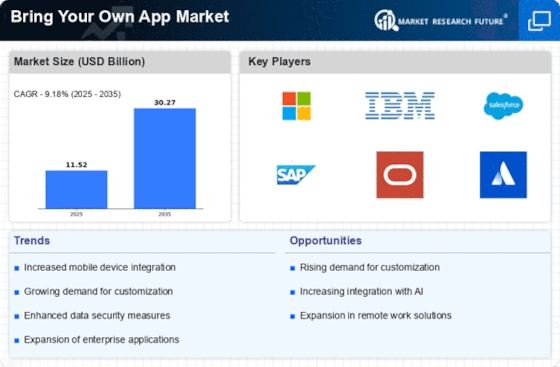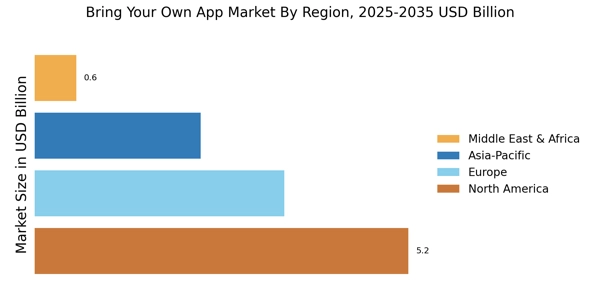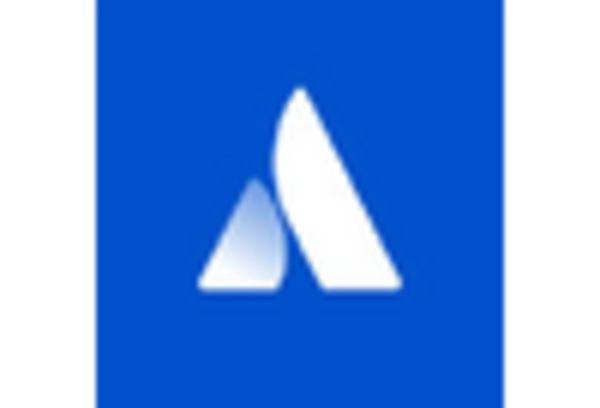The Bring Your Own App Market (BYOA) Market is characterized by a dynamic competitive landscape, driven by the increasing demand for flexibility and user-centric solutions in enterprise environments. Major players such as Microsoft (US), IBM (US), and Salesforce (US) are at the forefront, each adopting distinct strategies to enhance their market positioning. Microsoft (US) emphasizes innovation through its Azure platform, facilitating seamless integration of third-party applications, while IBM (US) focuses on leveraging its cloud capabilities to enhance security and compliance for BYOA solutions. Salesforce (US) continues to expand its ecosystem through strategic partnerships, enabling businesses to customize their applications effectively. Collectively, these strategies foster a competitive environment that prioritizes adaptability and user engagement, essential for capturing market share in an increasingly digital world.Key business tactics within the BYOA market include localized service offerings and supply chain optimization, which are crucial for meeting diverse customer needs across different regions. The market structure appears moderately fragmented, with a mix of established players and emerging startups vying for attention. This fragmentation allows for innovation and niche solutions, although the influence of key players remains substantial, as they set benchmarks for service quality and technological advancement.
In August Microsoft (US) announced the launch of a new feature within its Teams platform, enabling users to integrate third-party applications more seamlessly. This strategic move is significant as it not only enhances user experience but also positions Microsoft as a leader in the BYOA space, catering to the growing demand for customizable work environments. By facilitating easier integration, Microsoft strengthens its competitive edge, potentially attracting more enterprises looking for flexible solutions.
In September IBM (US) unveiled a new security framework designed specifically for BYOA applications, aimed at addressing the rising concerns around data privacy and compliance. This initiative underscores IBM's commitment to security in the digital transformation era, suggesting that the company is keen on differentiating itself through robust security measures. Such a focus may resonate well with enterprises that prioritize data protection, thereby enhancing IBM's market appeal.
In July Salesforce (US) expanded its AppExchange marketplace, introducing new tools that allow businesses to create and share custom applications more efficiently. This expansion reflects Salesforce's strategy to foster a collaborative ecosystem, encouraging innovation among its users. By enhancing its marketplace, Salesforce not only strengthens its position but also cultivates a community of developers and businesses that can drive further growth in the BYOA market.
As of October current competitive trends in the BYOA market are heavily influenced by digitalization, sustainability, and the integration of artificial intelligence. Strategic alliances are increasingly shaping the landscape, as companies recognize the value of collaboration in enhancing their service offerings. Looking ahead, competitive differentiation is likely to evolve, with a pronounced shift from price-based competition to a focus on innovation, technological advancement, and supply chain reliability. This transition suggests that companies will need to invest in cutting-edge solutions and partnerships to maintain their competitive edge in a rapidly changing market.


















